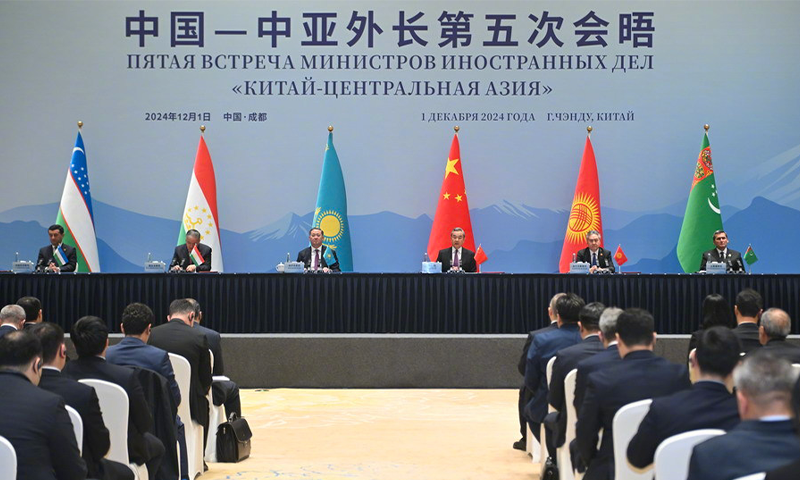
The Fifth China-Central Asia Foreign Ministers' Meeting Photo: Chinese Foreign Ministry
The Fifth China-Central Asia Foreign Ministers' Meeting, chaired by Foreign Minister Wang Yi, was held on Sunday in Chengdu, Southwest China's Sichuan Province. Together with the foreign ministers of the five Central Asian countries, he reviewed the implementation of the outcomes of the inaugural China-Central Asia Summit and conducted in-depth discussions on preparations for the second summit, scheduled to take place in Kazakhstan next year. The meeting enhanced mutual trust and friendship and clarified the direction for future work.
After the meeting, Wang, also a member of the Political Bureau of the Communist Party of China Central Committee, together with the foreign ministers of the five countries, summarized the outcomes and consensus of the discussions during a joint press conference.
Wang emphasized maintaining leadership by heads of state to strengthen the China-Central Asia mechanism. This involves continuing to implement the consensus reached at the China-Central Asia Summit held in Xi'an and advancing China-Central Asia cooperation. They expressed support for Kazakhstan in hosting the summit next year and agreed to begin the process of signing a joint declaration, action plan for high-quality joint construction of Belt and Road initiative, a Treaty of Good-Neighborliness and Friendly Cooperation among China and Central Asian countries, and other key cooperation documents. The meeting also aimed to shape a "China-Central Asia Spirit" based on the shared ideas and values developed during long-term cooperation.
Wang also stressed the importance of modernization goals and deepening comprehensive cooperation. This includes strengthening development strategy alignment, prioritizing trade, industrial investment, connectivity, green minerals, agricultural modernization, and people-to-people exchanges. Cooperation in areas such as application of the Beidou Navigation Satellite System, poverty alleviation, desertification management, and higher education will also be expanded. China is committed to increasing cooperation with Central Asian countries and establishing platforms for exchange.
The ministers also agreed on shared security responsibilities to maintain regional peace and stability. The parties will implement the Global Security Initiative, jointly combat the "three forces" - terrorism, separatism and extremism, oppose external forces interfering in the internal affairs of Central Asian countries, oppose creating chaos and instability in Central Asia, and support peace and reconstruction in Afghanistan.
In addition, the ministers emphasized cultural exchange and fostering lasting friendship between generations. They will continue to implement the Global Civilization Initiative, enhance exchanges on governance, accelerate the construction of cultural centers and Luban workshops, and expand cooperation in education, local governance, healthcare, and personnel training. In the next three years, China will provide 1,500 training slots and 600 additional scholarships to Central Asian countries.
Moreover, they reaffirmed their commitment to multilateralism and defending international fairness and justice. The parties will continue to strengthen coordination in international and regional affairs, promote solidarity among the Global South, oppose decoupling and "small yard, high fences" in any form, and support an equal, orderly, multipolar world and inclusive economic globalization.
They also pledged full support for China's chairmanship of the Shanghai Cooperation Organization and its efforts to promote new developments within the organization. They also agreed to jointly promote the correct historical view of World War II and safeguard its outcomes to protect hard-won peace and security.
The China-Central Asia Summit was held in May, 2023 in the city of Xi'an, in Northwest China's Shaanxi Province. It was the first in-person gathering among the heads of state of China and the five Central Asian countries since China established diplomatic ties with them 31 years ago.




